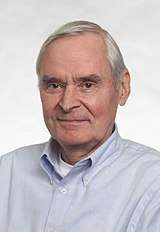David Todd Wilkinson
David Todd Wilkinson (13 May 1935 – 5 September 2002)[1] was a world-renowned pioneer in the field of cosmology, specializing in the study of the cosmic microwave background radiation (CMB) left over from the Big Bang.
David Todd Wilkinson | |
|---|---|
 | |
| Born | 13 May 1935 |
| Died | 5 September 2002 (aged 67 years, 200 days) |
| Alma mater | University of Michigan |
| Awards | James Craig Watson Medal (2001) |
| Scientific career | |
| Fields | cosmology |
| Institutions | Princeton University |
| Doctoral advisor | H. Richard Crane |
| Doctoral students | Marc Davis Suzanne Staggs |
Education
He was born in Hillsdale, Michigan, and earned his Ph.D. in physics at the University of Michigan under the supervision of H. Richard Crane.[2]
Research and Career
He was a Professor of Physics at Princeton University from 1965 until his retirement in 2002. He made fundamental contributions to many major cosmic microwave background experiments, including two NASA satellites: the Cosmic Background Explorer (COBE) and the Wilkinson Microwave Anisotropy Probe (WMAP), which was named in his honor after his death due to cancer.[3]
Awards
His numerous accolades include the Princeton President's Award for Distinguished Teaching, election to the National Academy of Sciences in 1983, and the James Craig Watson Medal (2001).
References
- "Dr. David T. Wilkinson, 67, a Physicist Who Searched for Big Bang's Echoes Is Dead". NY Times. 2002.
- Mather, John C.; Page, Lyman; Peebles, P. James E. (May 2003). "Obituary: David Todd Wilkinson". Physics Today. 56 (5): 76–77. Bibcode:2003PhT....56e..76M. doi:10.1063/1.1583543.
- "Physicist David Wilkinson, explorer of Big Bang afterglow, dies" (Press release). Princeton University. September 6, 2002. Retrieved 2009-09-17.